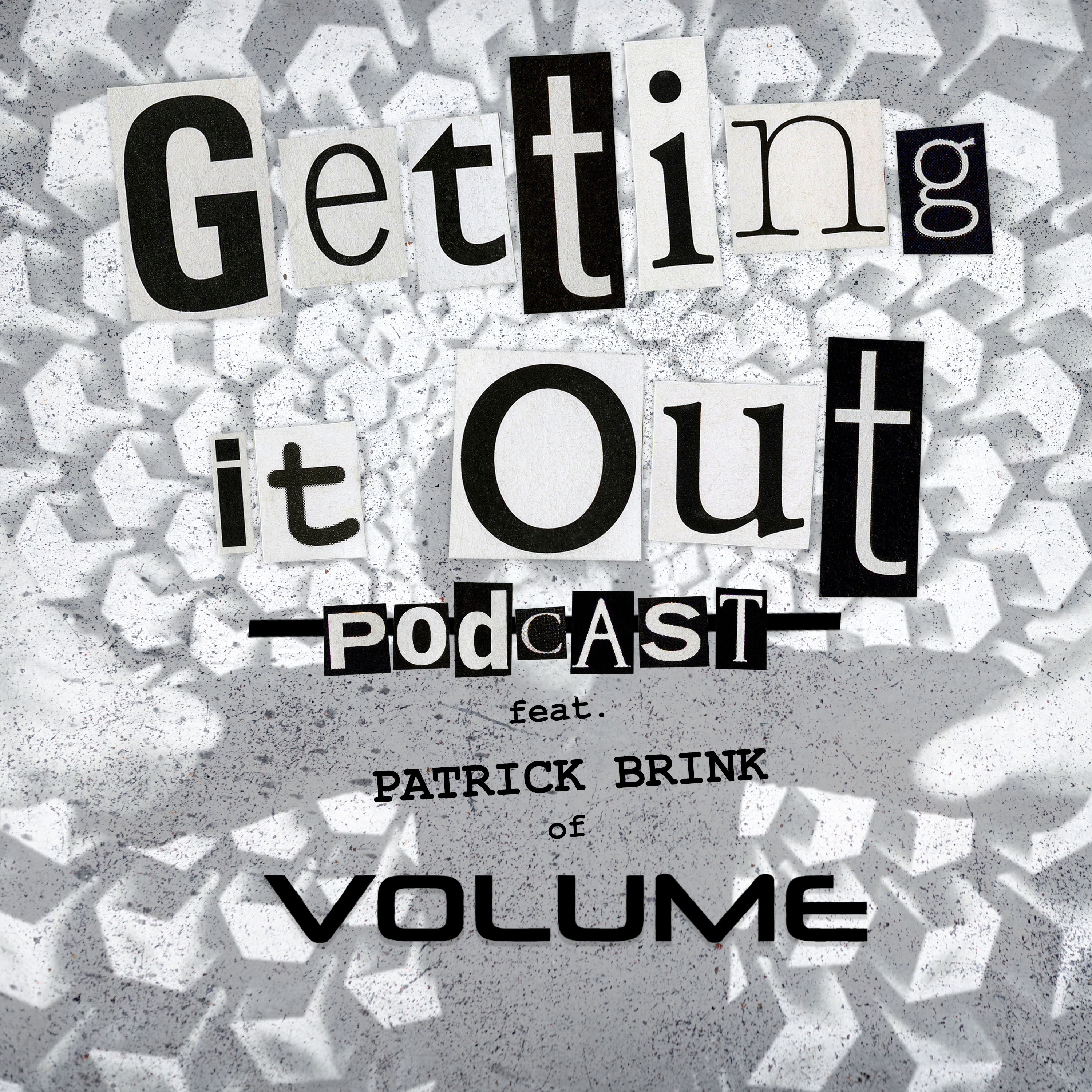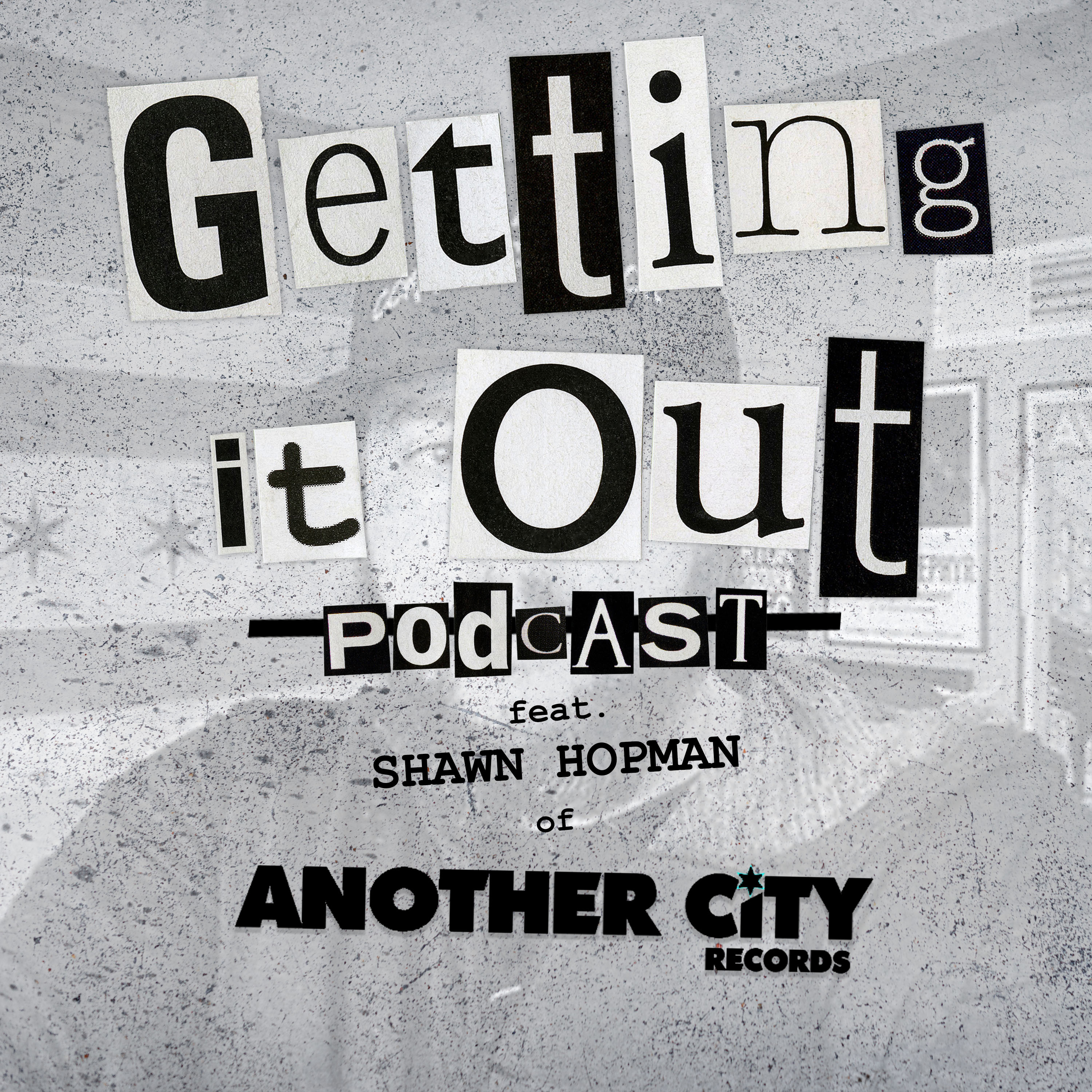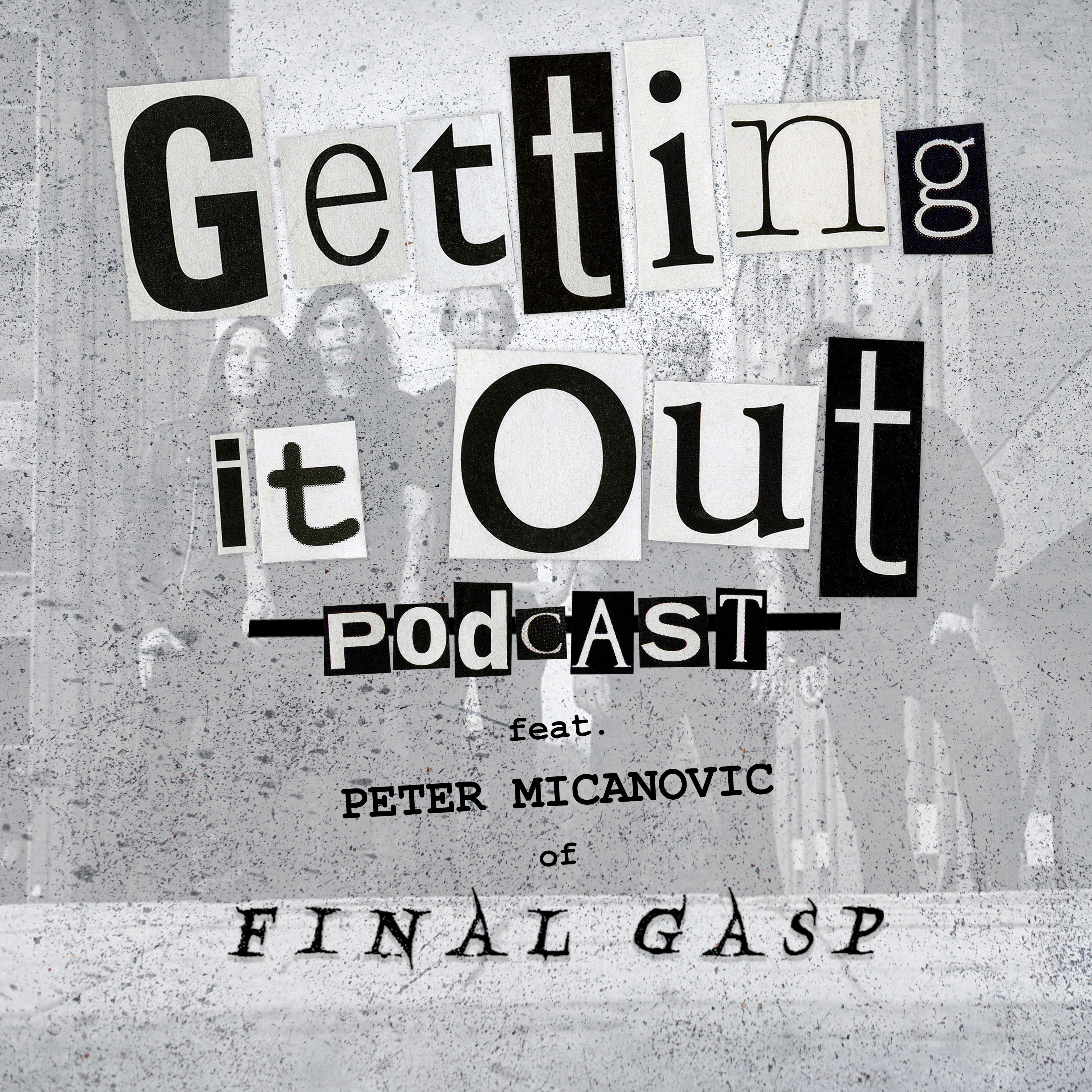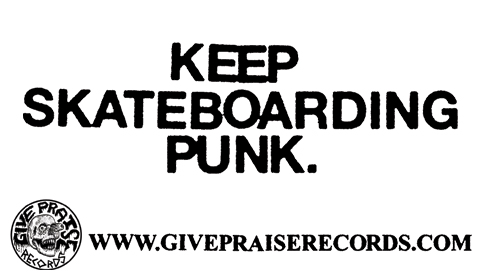Interview: Chris Pervelis of Internal Bleeding

Among the first bands to inentionally fuse death metal and hardcore, INTERNAL BLEEDING are peaking now, over thirty years since they began. With their latest album Settle All Scores released a few weeks ago courtesy of Maggot Stomp Records, guitarist and founder Chris Pervelis shared some thoughts.
The following is a portion of an interview presented in episode 480 of Getting It Out Podcast earlier this month. The full conversation can be heard HERE if you’d like to dive deeper.

Getting It Out: You've been… you've been doing it for a long time. 91? Is that right?
Chris Pervelis: Well, 91 was the germination, 92 was the band. Uh, I had a… I had the band together.The idea and all that stuff in 91.But the personnel and stuff like that wasn't right. And then, 92, it really clicked.
Getting It Out: What were you doing in Long Island? I guess you guys say on Long Island, don't you? On Long Island, in the late 80s, early 90s, that got you interested in this music to begin with?
Chris Pervelis: You know, I don't… so, I… I was in a bandcalled Autumn Rain in the late 80s, early 90s. And the vocalist of Autumn Rain had started getting into underground music. And he turned me on to it. So that's kind of how I got into it, and I was like, wow, this is awesome.
Getting It Out: So what was Autumn Rain, then? What was that sounding like?
Chris Pervelis: Autumn rain was… you know what? I think Autumn Rain would really do really well today. Um, it was kind of a mix between, like Black Sabbath, Death Metal, and jazz.
Getting It Out: I like all those things.
Chris Pervelis: Yeah, yeah, it was a… it was a really kind of cool, I wish, I, you know, I almost wish I developed the band more. I think my musical ability wouldn't allow me to at that time, but I had a vision of, like,I don't know, I wanted to do more…
I don't know, I can't explain it. Like, my musical abilities when I was in Autumn Rain, had hampered me from expanding the band. And then it just… it kind of fell apart, and then Internal Bleeding kind of started happening. I want it to go in a heavier, more extreme direction. And my vocalist, Eric Wigger, who was singing when Autumn Rain at the time was pushing me to go in that direction. And that's kind of how Internal bleeding started coming together.
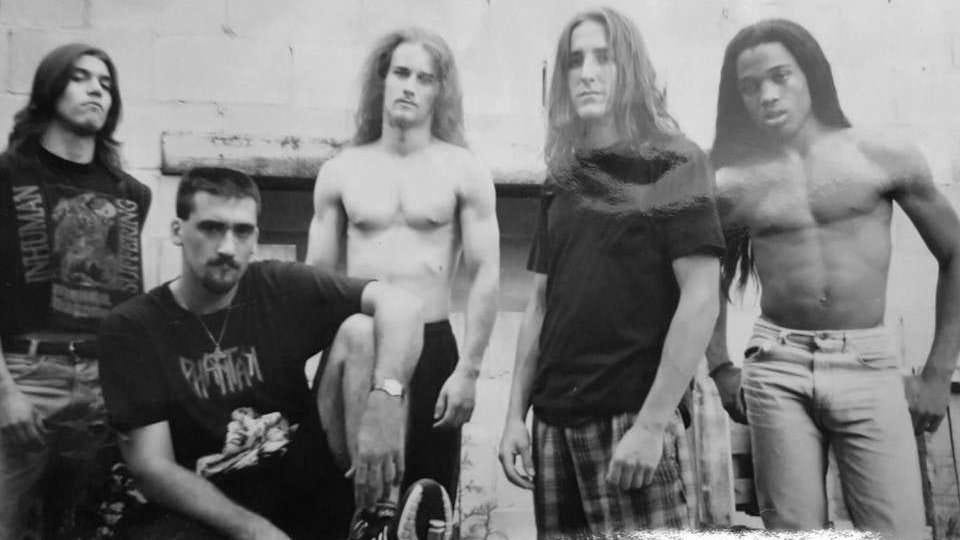
Getting It Out: How was the band received early on, in the area, locally?
Chris Pervelis: Okay, so, the first show we ever played was a talent contest of sorts. And we played with a bunch of like new wave bands. And we played, I'll never forget it, I was so scared, I sat and looked at my amplifier the whole time because I was so scared. And we played, and I thought we played really well. And people came up to us and said "You guys scared me."
And I knew right there we were onto something. You know, there were death metal bands back then, but, like, you know, we had just happened to have this play this show... that really put a spark onto me. I was like, "Wow, alright, we're on to something. This is fun. People are scared... they thought it was different."
They thought it was cool, and I got a big charge out of it, and all the guys in the band got a big charge out of it, and we said, let's go. Let's do it!
Getting It Out: Did it move quick back then?
Chris Pervelis: Very. We put out what's called the $1 demo. We called it that because I recorded it on a cheap 4-track recorder. And we… I'm not gonna say stole, but I'm gonna say we… liberated a bunch of tapes from a law school, Hofstra Law School. We overdubbed this demo on these tapes, on these law lecture tapes. We're like, this isn't worth more than a dollar, so we started selling it for a dollar and at that time, I had graduated college, I was a marketing major, and I started coming up with slogans, "barbarity for a buck."
It started taking off and things moved quickly, and the chemistry with the band that the lineup we had was there, and we practiced 4 to 5 times a week. It was super exciting and crazy, you know? You can't recapture that. You know, it was just lightning in a bottle, and it was great. It was just an amazing time of my life.
I mean, songs were coming… songs were coming out of us so fast. That we'd write a shitload of songs, and then we'd have to rewind and say, okay, we gotta edit all this stuff that we just wrote. You know, because everybody came to the table, and it wasn't just me. It was my other guitarist at the time, Anthony Maiola. He came up with a thousand things. My drummer, Billy, may rest in peace, he came up with a thousand ideas. We had so many ideas of what to do, and we just wrote and wrote and wrote and wrote and recorded on a boombox. And went back and listened to all the songs on a boombox, let's change this, let's fix this. It was great. It was just really an exciting time.
Getting It Out: Well, you've always been known, or at least you are known now, as a band that's appreciated by the death metal world and the hardcore world as well. Was that always the case?
Chris Pervelis: It was… I'd say 99%… 90% of the time it was the case. I think by the time our second demo, Invocation of Evil, came out. We made a conscious effort to play with hardcore bands. Because we thought our style of music would fit with hardcore. So we started playing shows with Neglect and hardcore bands on Long Island, and we purposely sought it out because we knew it would work.
Now, in hindsight, it kind of worked. But, fast forward 30 years later, it really works. It took time for the hardcore world to catch on to it. You know, but there, there were some great shows, I mean we played a show around Long Island, I think it was us, Cannibal Corpse, Hatebreed? And it was packed, and it was great, and we knew that we always had a hardcore sensibility. My drummer was a big Biohazard fan. I was a big Agnostic Front fan. So we had a real hardcore sensibility about us. And we brought it into death metal and even in the early days, we got a lot of shit for it.
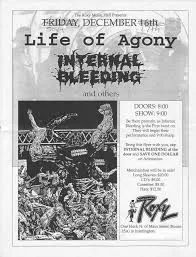
Getting It Out: From which side? Or both?
Chris Pervelis: From the death metal side. Not the hardcore side. The death metal side was very… "What is this with the short hair, and this and that, and blah blah blah?"
We didn't give a fuck. We knew what we were doing, and we were focused… we believed in what we were doing. You know? And, we got a lot of praise. Not gonna say we didn't, but we took a lot of slings and arrows, too. You know, and you have to slough it off. I mean, if you believe in what you're doing, you have to believe in what you're doing and block out all the negative stuff, you know?

Getting It Out: Right, well, I asked that, and I'm glad you said what you said about 30 years later it working, because I didn't know my death metal until… into the 2000s, probably until I'm in college. You know, before that, it was just like it was, metal, punk, and hardcore, for sure. But I didn't ever remember Internal Bleeding being part of that. And then, fast forward many years, and then suddenly it's Internal Bleeding, the classic, slam… death metal, hardcore band, and to me, it seemed like this appreciation came out of nowhere for a band that's been around for a long time. And so, for you to say it that way kind of confirms the way it felt for me.
Chris Pervelis: My father always used to say something to me when I was a little kid. He's like, "if you believe in something, you stick around long enough, and the world will turn your way."
You know, and that always stuck with me. We just… we just believed in it. And there were a lot of years where it was bad. Shows sucked. Nobody showed up. But we all believed in the music, you know? And it's just like… we gotta keep going. And the world finally turned and locked into place, and now we're playing these shows…
We played this show in Minneapolis last summer (with) mostly young bands. I think the oldest person was probably 25. It was all this hardcore-influenced death metal. And all these kids in their 20s, they all knew who we were, and they all freaked out when we played.

I talked to all these kids for hours. Just talking to them, having a great time, you know, like the time of my life, it was just… it was fantastic. It was almost like, um… we've finally been…
Getting It Out: Validated?
Chris Pervelis: Validated, yes! Finally validated. Of all the work that we put in, and the validation has finally come. And it's a great feeling, and I'm super happy about it. And I'm humbled over it, and it's just… it's awesome. You know, it's great. I never thought this would happen.
Getting It Out: Yeah, it's… I mean, that's one of the things that I'm a big believer on, is just show up. Just keep showing up.
Chris Pervelis: You know, and that's what you gotta do, you gotta show up, and… and even when the chips are down, you gotta show up, you gotta… you gotta pull yourself up, and you gotta… you gotta do it, and… Listen, we've been through a lot of shit. And… a lot of heartache, and a lot of being screwed by people, but we always… somehow… and I don't know if it's my leadership abilities or everybody else, it just… pick yourself up and just go forward. You know, what else is there? Were you gonna surrender and die?
You know what I'm saying? There's no option.
Getting It Out: Well, to speak to that, that theme of that. Isn't that a bit what this new record, Settle All Scores, is about?
Chris Pervelis: 100%. You got it. It's 100%. This album is a look back on all the people, and the industry people, and the zines and the mainstream press that… that poo-pooed us and… and said we were garbage, and we were just another clone of X-band, and this and that, and they never understood it. And it's a giant fuck you, you know?
Every song… not every song, but most of the songs on the album are about people in the scene. And I'm not gonna mention them. That's for fans to figure out, but it's a very personal album for both me and my other guitarist, Chris McCarthy.
Incredibly personal. And we got our aggression out on these people. You know, and it feels good, it's cathartic. Cathartic is a good word, you know? It's okay, I mean, I deserve to get a little payback.

Getting It Out: I think it'd be great if you made the song titles their names. That would be fun.
Chris Pervelis: No, I would never do that, because I'm not… is callow the word? I'm not so callow to actually name the people that I'm talking about.
Getting It Out: Well, that's the right thing. You're doing the right thing.
Chris Pervelis: I would never, I would never do that, because it's classless. I want the person listening to the songs to… They don't have to picture what I'm picturing. They have to picture… “Yeah, that guy, when I was in third grade.That guy who picked on me, that guy who spit on me, that guy who did this, and look where I am today, and look where he is today.”
You know, so if you explain everything, then you take away the personal aspect of the songs. I want… I want people to put themselves in their own shoes and say, “yeah fuck that guy. I remember that guy when I was a kid. I remember that guy when I got fired from my job, and he was a lazy fuck and didn't do anything.”
You know, that's… that's why I don't name names, because I want… I want people to put themselves in their own shoes and have a cathartic experience.
Getting It Out: Sure, it makes it more universal.
Chris Pervelis: Right, exactly.
Getting It Out: At this point, does Internal Bleeding have the most fans yet?
Chris Pervelis: Yes. This is… this is the peak of our career, for sure.
Getting It Out: When did you notice the surge?
Chris Pervelis: Good question. You know, it came out of nowhere, so maybe 3 years ago? All of a sudden, the upticks in things like Instagram follows, and the amount of direct messages I got.
More hardcore festivals and shows started asking us to play shows. I said, “Oh, something's happening here.”
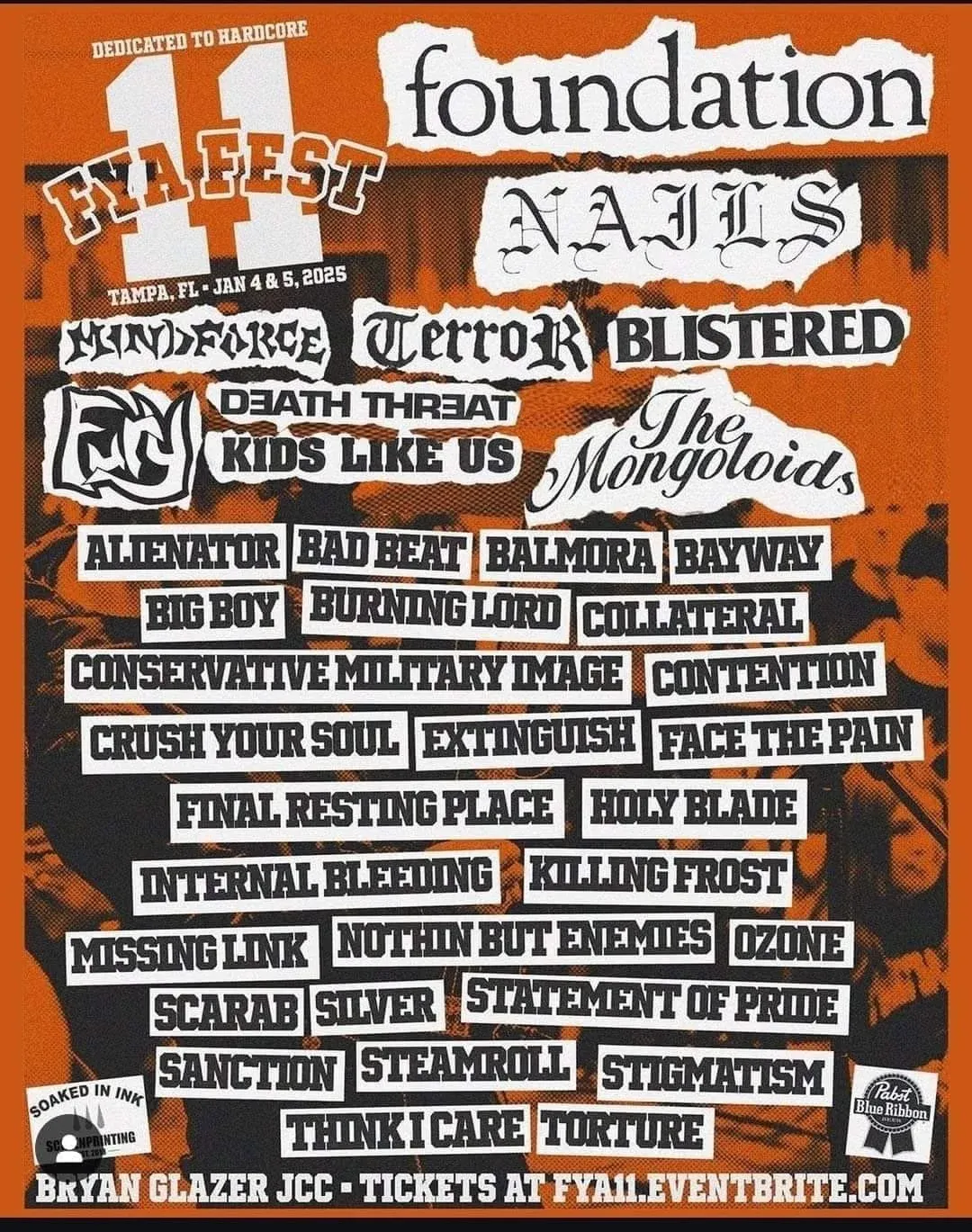
You know, we made… we made a lot of decisions as a band. Strategically to position ourselves where we should be. So, for example… 2018, we were signed to Unique Leader. I love those guys. Love the label, they treated us well.
But they didn't… I don't think they understood who we were. So we went to Scott and Maggot Stomp, who knew who we were. And perhaps Maggot Stop is a smaller label in as far as, like, distribution and all that stuff is concerned. But Scott understands the band. He understands how to market the band. He understands our aesthetic. We've had a consistent aesthetic since the 90s.
I developed a graphic look for the band. Since the 90s, he understood that, so he kind of understood all that, and so we made a… was it a parallel move? Maybe it was a step down, as far as size of label. But… when it comes to the label really understanding a band and being foursquare behind a band. He was the right choice. You know what I'm saying?
Getting It Out: Absolutely, I think it's a perfect home for internal bleeding. Because when I think of Maggot Stomp records, I think of bands that…at least for a time period, were one foot in hardcore, one foot in death metal.
Chris Pervelis: Right, and that's… that's Internal Bleeding!
I'm almost 60. At my age I just want to be on a label where a guy understands who I am I understand this is a business, and people have to make money. But, like I said, at my age, you know, I just want to be friends with the guy, um, who's my label.

And him and I hash things out, we talk about things, we'll go… our text messages could be a mile long, talking about the dumbest little aspect of the band. You know, and I love that. It’s like, this guy gets me, he understands me, he understands who I am as a person. He understands the band. He understands all the guys in my band. He has a personal relationship with.
It's pretty awesome, and it's pretty liberating that I don't have to do this to make a living. So that's… that's really liberating.
Getting It Out: Right. Does that make it more fun and enjoyable? Because it seems like you're having a great time now.
Chris Pervelis: Yes, it makes it much fun… much more… I worry about my business. You know, my main business that I own. I don't worry about that 24-7, but… the band? Sure, I worry about it, but… it's fun. It's my release, it keeps me young. You know, I get up there on stage… a lot of people can't believe how old I am. You know, and that's a wonderful thing, and it keeps me young, and it's awesome, and I am super thankful that I'm still here, and you know, look, I'm gonna be honest. I'm looking at retiring from the band.
Only because I missed out on a lot of my life because of the band. And, you know, sometimes I think, I can retire soon because the band has reached a peak. And like Seinfeld said, “Go out on a high note.”



